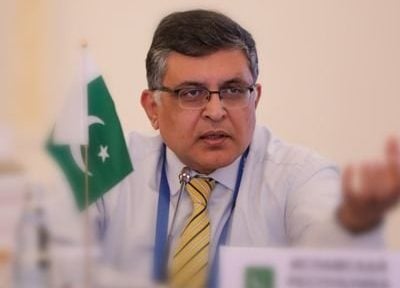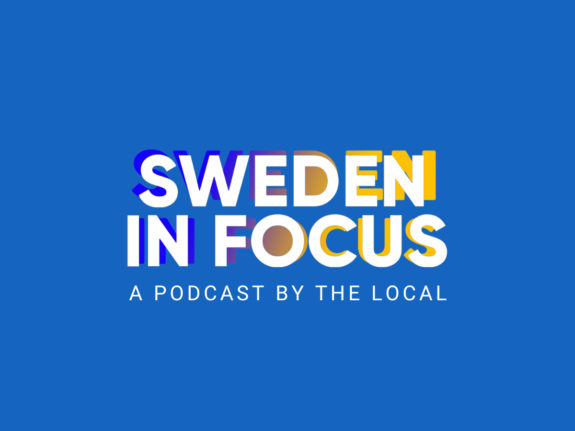Like last week’s interviewee, Irish ambassador Austin Gormley, Ahmed arrived in Sweden two years ago, right in the middle of the Covid-19 pandemic.
“We like to say that we are the Covid ambassadors, so we had a lot of things in common,” he jokes about Gormley and himself.
“What was interesting with the Swedish model was that in terms of official meetings, you wouldn’t be meeting people face-to-face. But there were still possibilities of having social meetings, in a smaller group, in restaurants. And people would even be willing to come to my office.”
Back in Pakistan, all the offices had still been kept open, but all the restaurants had been closed.
Ahmed is a career diplomat who joined the Foreign Service of Pakistan after passing the country’s competitive civil service exams. He has a degree in medicine, an MBA from the Philippines, and a PhD from the University of Liverpool, all in all a pretty impressive CV.
But one of the things he has found most refreshing about life in Sweden has been the lack of the status hierarchies which play such a big role back home in Pakistan.
“This has actually impressed me a lot about Swedish society. I’ve met some of the CEOs and had lunches with them, and at the end of the lunch, we all picked up our plate and put them in the sink, and we made coffee for ourselves. And I really liked that,” he says. “I think that down-to-earth way of thinking, this not thinking too big of yourself, is a very good way [to be].”
It’s a far cry from the way business leaders, politicians and top diplomats behave back in Pakistan.
“In Pakistan, we have a very hierarchical sort of management style and that is partly also because that we are a society which thinks in collective terms. We are not an individualistic society. The head of the business, the head of an organisation, is like a father or a mother figure to the whole institution. So, you don’t speak up to your father. You don’t have a free discussion with your father or mother. You have controlled sort of discussion.”
Listen to the interview in the latest episode of Sweden in Focus
Listen & Follow: Apple | Spotify | Google
The other thing he appreciates about living in Sweden is what he calls “the quality of the air”.
“I’m not an environmental scientist, but the quality of air, I can feel it that it opens up your lungs, and that’s probably got something to do with the two biggest resources that Sweden has got: its clean water and its forests. The first thing that I noticed when I came here is, that, ‘man, the air is really good’.
An unusually educated community
Pakistanis in Sweden are quite unique, Ahmed believes. A significant share of the roughly 25,000-strong community are graduates of Swedish universities, and even those that aren’t tend to be highly-skilled professionals.
“I have dealt with Pakistani-origin people in many countries and the interesting thing here is that the percentage of professional people, the percentage of educated people, is much higher here than in any other Pakistani-origin community in the rest of the world. And I think that’s why they have created a very good name for themselves.”
Many work in IT or as engineers, and there are about 50 doctors, he said. There are also some less-skilled workers, who work in restaurants or in the construction industry, but they are in a minority.
Ahmed sees a lot of potential in using the knowledge and cultural understanding of this group to exploit some of the opportunities back home in Pakistan.
“I think there is a lot of potential for developing collaborations in the IT sector, and, generally, in the technology sectors. And I think that is because these people have awareness of issues in Pakistan, the market in Pakistan, and they also have awareness of Swedish technology and of the management style of Swedish companies. So this is what we typically like to call a win-win situation.”
He says it is hard to pin down exactly how many Pakistanis there are in Sweden.
“It depends how how you define a Pakistani. Most of the Pakistanis here are dual nationals. They are Swedish and Pakistani. And then there are people who were not even born in Pakistan, but they are of Pakistani heritage. So those people don’t come into the figures of the Swedish authorities.”
Links between Sweden and Pakistan
Pakistan is one of the major suppliers of textiles to Swedish companies such as Ikea, H&M, and Mio, and it also exports basmati rice, mango juice, pink Himalayan salt, and now dates, Ahmed explained.
On the business side, the Swedish technology giant Ericsson has been operating in Pakistan for more than 50 years and the Rausing family, which founded the company Tetra Pak, from 1989 helped fund the Rausing Executive Development Centre, one of the leading management education centres in Pakistan.
“There is a lot going on, but there is a lot of potential also to do more,” he says, adding that there are “some very good stories actually.”
Among them are Ericsson establishing a “nearshore development centre” in Pakistan.
“There is another company which came to us last year and they have been doing software development in a specific area of telecommunication, and last year, they decided that they will do all their development from Pakistan.”
“These are the kinds of partnerships which are emerging… and I think that is something where we can both learn from each other and benefit from each other.”
The surprising importance of Swedish
Asked what has most surprised him since coming to Sweden, Ahmed points to the language.
“I am a little surprised at the value that is attached in Swedish society to the Swedish language,” he says. “My impression was that Sweden is an English-speaking country, and that is true to a certain extent. Wherever you go, you have no problem in getting by if you know English.
“But they have this affinity towards their language, which is very interesting and which I think reflects the uniqueness of their culture. If it’s an official meeting, you don’t need to talk Swedish at all. You can do everything. But when you sit for fika, for a relaxed conversation, then they slip into the Swedish language.”
That is the reason why Ahmed always advises Pakistanis arriving in Sweden for either work or study to put effort into getting to grips with the language.
“If you learn the Swedish language, with that, you will also get to understand Swedish culture and the Swedish way of thinking, and that will make you a more useful member of society.”
It’s not, however, advice that he has managed to act on himself. His Swedish, he confesses with a laugh, is “not really very good”.
His defence is that he lives in the diplomatic subset of the “expat” world. “So it’s a bubble within a bubble. But, having said that, I’ve tried to study a little bit of Swedish history. But I’ve not been successful in the language that much. The primary reason is that everybody speaks English. So for all my Swedish-speaking friends out there, please speak to me in Swedish. I think I can improve.”
By Paul O’Mahony and Richard Orange



 Please whitelist us to continue reading.
Please whitelist us to continue reading.
Member comments